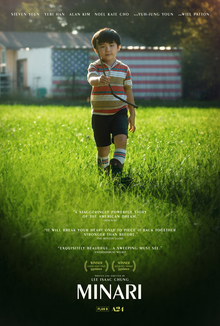Earlier I talked about the wave of Asian-American cinema we’re seeing and here’s one about the Korean-American experience and it’s even set in the 1980s. This one seems at least partly autobiographical on the part of its director Lee Isaac Chung who indeed was born of a South Korean immigrant family and grew up on a farm in Arkansas. It’s so specific in its detail that it feels authentic. At the same time it’s the kind of slice-of-life that doesn’t really lead anywhere and so didn’t leave a particularly deep impression on me. It’s still a strong film that deserves its many award nominations and wins.
Jacob Yi moves his family from California to rural Arkansas where he has purchased a plot of land to start a farm. His wife Monica is skeptical and objects for a variety of reasons including the distance to medical care as their son David was born with a weak heart. Jacob eventually appeases her by having Monica’s mother Soon-ja come from South Korea to live with them and care for the children. Meanwhile both parents still work in a chicken hatchery to separate male chicks from female ones and Jacob works on his farm growing Korean vegetables in his spare time. He hires a local man, Paul, a very devout Christian to help out and tries to save money by getting water for the farm from a well he digs himself. As their finances are strained by the difficulty of marketing their vegetables and Jacob’s eventual need to pay for municipal water, his relationship with Monica deteriorates as she insists they move back to California. David too has his own difficulties with Soon-ja as he feels she doesn’t behave like the stereotypical American grandmother he has come to expect but they are later able to bond and he helps her plant the minari herb beside a nearby creek.
Though Jacob has his problems with Monica and David is petulant towards Soon-ja, this film is actually rather low on human drama by cinema standards. The overall theme is that life is tough but people persevere which is hardly exciting stuff but it does help that this is framed as a realistic depiction of a Korean immigrant family in the US. I keep wondering why Jacob picked Arkansas of all places, but I suppose there doesn’t need to be any better reason than the fact that land cheap there and he has a dream of running a farm of his own. The true strength of this film are all of the rich details of their lives: befriending Paul who seen from one angle seems like a religious nutjob who carries a heavy cross on his shoulder on Sundays as a form of worship, from another angle, a genuinely friendly and helpful neighbor, going to a local church frequented mostly by whites and feeling awkward there. In the background, we learn that many other Koreans are moving to the US and Jacob’s insight that this creates a market for Korean food. It’s is really convincing how Chung must have drawn on his own memories as the details are too eclectic to be made up.
I still feel that the ending lacks proper closure as the film just kind of peters out. At least let us know if they actually manage to market the minari herb! It’s also a little disappointing how the film only lightly touches on some topics which I found fascinating, such as another Korean woman’s claim that those of them who moved to such rural areas did so at least partially to avoid Korean churches. Similarly Jacob and Monica reminiscence at one point about the reason that they moved to the US in the first place being because life in South Korea was so hard. The timeline for this matches the period that the country was run under a military dictatorship but there’s no mention of that here. By being such a personal, narrowly focused story, this film achieves authenticity but it also feels a little underwhelming, having not much ambition at all.
It’s still pretty great to watch films like this depict the life stories of completely ordinary people and this one scores extra points for being a perspective that is underserved in various media. As Asian-Americans come into their own identity, I look forward to more films like this.
